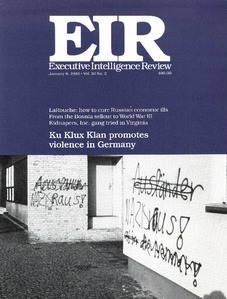Interviews
Lyndon LaRouche
The economist and statesman speaks from his prison cell on the deadly disease of “political correctness,” the crisis in Russia, and what to do to solve the world economic depression.
Lawrence Klein
The former director of Wharton Econometric Forecasting at the Wharton School of the University of Pennsylvania, and now professor at the University of Pennsylvania, Klein was recently hired as chief economic adviser to the State Planning Commission of the People’s Republic of China.
Books
Liberal Democracy and the End of Mankind
by Mark Burdman
The End of History and the Last Man, by Francis Fukuyama.
Strategic Studies
Qin Shi-huang, Klein, and the Destruction of China
by Michael Billington
The P.R.C. government’s announcement of a new annual festival, dedicated to the most infamous tyrant of Chinese history, is equivalent to holding a festival in the West in honor of the Roman Emperor Caligula. Not coincidentally, it coincides with strengthened ties to U.S. economist Lawrence Klein. Michael Billington reports.
China ‘Economic Czar’: Don’t Develop Quickly
An interview with Lawrence Klein.
Profile: Lawrence Klein
Departments
Report from Bonn
by Rainer Apel
Blue Overalls, Not Blue Helmets.
Report from Rio
by Silvia Palacios and Lorenzo Carrasco
The End of the Collor Farce.
Andean Report
by Gretchen Small
Shining Path Steps Up War in Peru.
Panama Report
by Carlos Wesley
POWs Score Prelate’s “Complicit Silence.”
Editorial
Cold Turkey.
Economics
Bankers Push Forbearance To Keep Debt Bubble Afloat
by John Hoefle
The con job by the banks to save themselves by further looting the economy and the public, is being presented not as the thievery and fraud that it is, but as an attempt to stimulate the “recovery.”
Gaidar Is Out, But His Policies Remain
by Denise Henderson
Return to Fundamentals of Production-Based Economics
by Lyndon H. LaRouche, Jr.
An interview with Lyndon LaRouche.
Keynes’s Fascism with a British Face
by Jonathan Tennenbaum
Warns the patriots of eastern Europe and the Third World not to fall for fascist economics in Keynesian disguise.
In Memoriam: Minoru Toyoda
Currency Rates
Vatican’s Cardinal Sodano Backs Neoliberal Economics
by Carlos Méndez
Transport Associations Attempt To Head Off Clinton Retreat
by Anthony K. Wikrent
The President-elect has already begun to backpedal from the centerpiece of his economic stimulus program: a $20 billion increase in spending on U.S. physical infrastructure.
Agriculture
by Nigel Gleeson
Australian Farmers Fight Back.
Business Briefs
Feature
Anglo-Americans Fostering Nazi Revival in Germany
by Jeffrey Steinberg
The Nazi revival would not be occurring except for a sweeping destabilization of Germany by the same British, American (and, now, Israeli and Zionist lobby) factions, which earlier supported the rise of Adolf Hitler to power in 1933.
Antifascists vs. Anti-Antifascists: The ‘Strategy of Tension’
by Angelika Beyreuther-Raimondi
ADL Creates Ku Klux Klan and Nazi Chaos in Germany
by Scott Thompson
International
Beijing and Moscow Enter a ‘New Era’ in Relations
by Linda de Hoyos
Boris Yeltsin’s visit to China, and the array of agreements signed there in all areas, point up the abject failure of Anglo-American policy toward the East.
Russian General Tells the Truth: From the Sellout of Bosnia to the Maelstrom of World War III
by Katherine Kanter
Inter-American Dialogue ‘Sharpens Dagger’ against National Sovereignty
by Gretchen Small
Documentation: Excerpts from Convergence and Community: The Americas in 1993.
The Dr. Alvarez Machaín Case: Thornburgh’s Kidnapers Knew It Was Wrong Man
by Andrea Olivieri
International Intelligence
National
Bush Pardons ‘Political’ Targets—But Not LaRouche
by Jeffrey Steinberg
If Bush were truly concerned, as he says he is, about “criminalization of policy differences,” he would have granted executive clemency to Lyndon LaRouche. Instead, observers are asking whether Bush will pardon himself next.
Corrupt Judge Fixes Acquittal of ‘Kidnapers, Inc.’ Gang in Virginia
Congress Continues BNL Probe Despite Justice Department Coverup
by Edward Spannaus
U.S. Family Farmers Tell Story of Usury and Human Rights Violations
by Suzanne Rose
A report from the Dakotas on public hearings conducted by.a Schiller Institute committee headed by retired Washington State Supreme Court Justice William C. Goodloe.
National News



